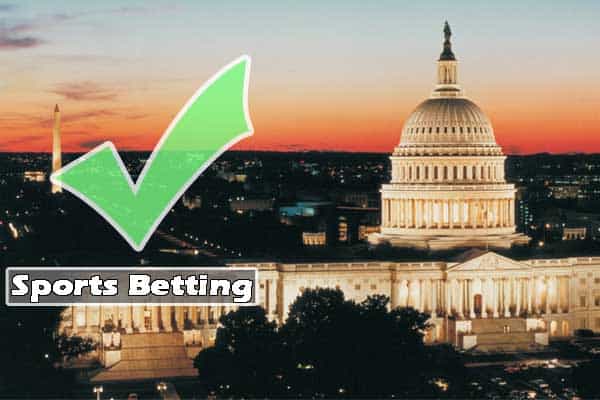The odds of sportsbooks launching in the nation’s capital next year are extremely high right now.
The Washington D.C. City Council voted in favor of the Sports Wagering Lottery Amendment Act of 2018 on Tuesday, which would legalize sports betting and allow venue and business owners to operate sportsbooks within the city limits of the nation’s capital.
Council member Jack Evans introduced the bill, which was approved with an 11-2 vote. For the bill to become law, Mayor Muriel Bowser will need to sign the bill and hand it over to be reviewed by Congress, which isn’t expected to challenge the legalization of sports betting within the District.
The newest members of Congress, who were elected during the 2018 Midterm Elections, will be coming in early January 2019, and supporters of the sports betting bill hope to allow D.C. residents and visitors the chance to vote at sportsbooks within the city limits by mid-2019.
Sports betting will be authorized by the D.C. Lottery and sports venues and private businesses with the city limits will be eligible to apply and be issued a license to run a sportsbook, excluding RFK Stadium, which is on federal land and is prohibited from offering any form of gambling.
For a license to operate a sportsbook in D.C., stadiums and arenas will pay $250,000 over five years and private businesses will pay $5,000 over two years.
In addition, the revenue generated from sportsbooks operating within the city limits will be taxed at a rate of 10 percent from revenue earned from in-person sports betting and 20 percent for online sports betting.
However, only the D.C. Lottery will be allowed to run an online sportsbook app available to people across the city. Stadiums and arenas will be allowed to run online sportsbook apps but are restricted to the property of the facility.
Tax revenue generated from sports betting in Washington D.C. will go directly toward different programs in the city, which include ones to help with gambling addiction, Birth to 3 programs, and a violence prevention fund.
All of this became possible in May 2018 when the Supreme Court ruled that the Professional and Amateur Sports Protection Act (PASPA) was unconstitutional because the federal government does not have the authority to tell states what laws they can enact.
PASPA prevented states from crafting legislation to determine on their own whether to legalize sports betting. Nevada was the only state will a full-exemption.
When D.C. launches its sportsbooks, it will join the previously exempt Nevada and seven other states that now offer sports betting, which includes Delaware, New Jersey, Mississippi, West Virginia, New Mexico, Pennsylvania, and Rhode Island.

